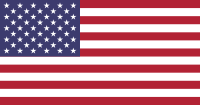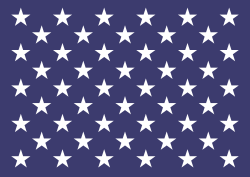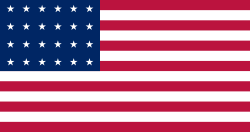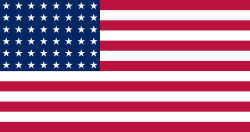USA:s flagga
| USA:s flagga | |
 | |
| Användning | |
|---|---|
| Proportioner | 10:19 |
| Antagen | 4 juli 1960 (nuvarande version) |
USA:s flagga har 13 ränder (7 röda och vita 6) som representerar de 13 ursprungliga delstaterna och 50 vita stjärnor på mörkblå bakgrund som representerar USA:s nuvarande 50 delstater. Flaggans nuvarande utseende antogs den 4 juli 1960, men fastställdes till sitt huvudmönster under amerikanska frihetskriget. Den har proportionerna 10:19.
Flaggan brukar kallas Stars and Stripes (stjärnor och ränder), Old Glory (gammal ära), the Old Red eller the Star-Spangled Banner (det stjärnbeströdda baneret). Det senare namnet har givit upphov till namnet på USA:s nationalsång.
De officiella färgerna bestämdes 27 november 1981 till:[1]
| Old Glory Red (Gammal ära röd) | Old Glory Blue (Gammal ära blå) | White (Vit) | |
|---|---|---|---|
| Pantone Systemet | Red PMS 193 | Blue PMS 282 | |
| RGB | # C30C3E 195, 12, 62 | # 00204E 0, 32, 78 | # FFFFFF 255, 255, 255 |
Historia

Flaggan fastställdes till sitt huvudmönster under frihetskriget, men har förändrats 26 gånger sedan dess, bland annat för att man lägger till en stjärna för varje ny delstat. Flaggans nuvarande utformning är från 1960, då den 50:e stjärnan lades till (efter att Hawaii blivit delstat 1959). Från början hade man tänkt sig att förutom en stjärna även lägga till en extra rand när en ny delstat anslöt sig till unionen. Från 1795 (efter att Vermont och Kentucky anslutit sig) hade flaggan således 15 stjärnor och 15 ränder, men när fem nya stater tillkom tyckte man antagligen att det växande antalet ränder störde flaggans design. Kongressen bestämde sig 1818 för att återgå till 13 ränder och i framtiden bara lägga till en ny stjärna för varje ny delstat. Varken stjärnorna eller ränderna står var och en för någon viss delstat, utan de representerar bara tillsammans de 50 nuvarande respektive de 13 ursprungliga.
Från början fanns det inga regler om i vilket mönster stjärnorna skulle läggas ut på det blå fältet, men numera bestäms det genom förordning av presidenten. När en ny delstat blir medlem av unionen, lägger man till en ny stjärna till flaggan nästkommande 4 juli (USA:s nationaldag).
Historisk utveckling av flaggans utformning
Följande tabell ger en översikt över de 28 olika utformningar som har använts för USA:s flagga. Den exakta utformningen, inklusive färgspecifikation, blev inte standardiserad förrän 1934.[2]
| Antal stjärnor | Antal ränder | Utformning | Stater representerade av nya stjärnor | Period | Tid som flaggan var aktuell |
|---|---|---|---|---|---|
| 0 | 13 |  | Inga stjärnor | 3 december 1775[3]–14 juni 1777 | 1 år och 194 dagar |
| 13 | 13 | Delaware, Pennsylvania, New Jersey, Georgia, Connecticut, Massachusetts, Maryland, South Carolina, New Hampshire, Virginia, New York, North Carolina, Rhode Island | 14 juni 1777–1 maj 1795 | 17 år och 350 dagar | |
| 15 | 15 | Kentucky, Vermont | 1 maj 1795–3 juli 1818 | 23 år och 64 dagar | |
| 20 | 13 | Indiana, Louisiana, Mississippi, Ohio, Tennessee | 4 juli 1818–3 juli 1819 | 1 år | |
| 21 | 13 | Illinois | 4 juli 1819–3 juli 1820 | 1 år | |
| 23 | 13 | Alabama, Maine | 4 juli 1820–3 juli 1822 | 2 år | |
| 24 | 13 | Missouri | 4 juli 1822–3 juli 1836 | 14 år | |
| 25 | 13 | Arkansas | 4 juli 1836–3 juli 1837 | 1 år | |
| 26 | 13 | Michigan | 4 juli 1837–3 juli 1845 | 8 år | |
| 27 | 13 |  | Florida | 4 juli 1845–3 juli 1846 | 1 år |
| 28 | 13 | Texas | 4 juli 1846–3 juli 1847 | 1 år | |
| 29 | 13 |  | Iowa | 4 juli 1847–3 juli 1848 | 1 år |
| 30 | 13 | Wisconsin | 4 juli 1848–3 juli 1851 | 3 år | |
| 31 | 13 | Kalifornien | 4 juli 1851–3 juli 1858 | 7 år | |
| 32 | 13 | Minnesota | 4 juli 1858–3 juli 1859 | 1 år | |
| 33 | 13 | Oregon | 4 juli 1859–3 juli 1861 | 2 år | |
| 34 | 13 | Kansas | 4 juli 1861–3 juli 1863 | 2 år | |
| 35 | 13 |  | West Virginia | 4 juli 1863–3 juli 1865 | 2 år |
| 36 | 13 | Nevada | 4 juli 1865–3 juli 1867 | 2 år | |
| 37 | 13 | Nebraska | 4 juli 1867–3 juli 1877 | 10 år | |
| 38 | 13 | Colorado | 4 juli 1877–3 juli 1890 | 13 år | |
| 43 | 13 | Idaho, Montana, North Dakota, South Dakota, Washington | 4 juli 1890–3 juli 1891 | 1 år | |
| 44 | 13 |  | Wyoming | 4 juli 1891–3 juli 1896 | 5 år |
| 45 | 13 |  | Utah | 4 juli 1896–3 juli 1908 | 12 år |
| 46 | 13 |  | Oklahoma | 4 juli 1908–3 juli 1912 | 4 år |
| 48 | 13 |  | Arizona, New Mexico | 4 juli 1912–3 juli 1959 | 47 år |
| 49 | 13 |  | Alaska | 4 juli 1959–3 juli 1960 | 1 år |
| 50 | 13 |  | Hawaii | 4 juli 1960– | 64 år och 42 dagar (längst hittills) |
Örlogsflagga

Flaggan på amerikanska flottans båtar, USA:s örlogsflagga, var först en flagga med rödvit randning efter order av örlogschefen Esek Hopkins i slutet av 1775.[4] Efter att stjärnbaneret introducerats som USA:s flagga 1776 började flottan använda det blå fältet med stjärnor, men utan det rödvita randningen, som örlogsflagga. Den kallas "Union Jack", och har alltså samma namn som den brittiska unionsflaggan Union Jack, och den utökades under åren med en stjärna för varje stat som uppgick i USA.[5] Under kortare perioder har varianter av den rödvitrandiga flaggan med en skallerorm och texten "Dont tread on me" använts av flottan..[6][5]
Se även
Referenser
Noter
- ^ ”Specifications For The United States Flag”. www.chamberofcommerce.org. https://www.chamberofcommerce.org/usflag/flag.specs.html. Läst 30 september 2022.
- ^ För varianter av flaggan, se Stars of the U.S. Flag page Arkiverad 22 februari 2005 hämtat från the Wayback Machine. på FOTW:s hemsida.
- ^ Leepson, Marc. (2005). Flag: An American Biography. New York: St. Martin's Press.
- ^ ”Don't Tread on Me Flag History”. www.navyjack.info. http://www.navyjack.info/history.html. Läst 10 januari 2021.
- ^ [a b] ”U.S. Navy to Return to Flying the Union Jack” (på engelska). The Maritime Executive. https://www.maritime-executive.com/article/september-11-u-s-navy-to-return-to-flying-the-union-jack. Läst 10 januari 2021.
- ^ ”Naval Jack (U.S.)” (på engelska). FOTW. https://flagspot.net/flags/us%5Envj.html. Läst 5 mars 2015.
Källor
- Allt om världens flaggor. Stockholm: Bonnier Impact. 2007. sid. 13-14. ISBN 91-85605-09-3
- Avsnittet "Historisk utveckling av flaggans utformning" är översatt från artikeln "progression of designs Flag of the United States" (avsnittet "Historical progression of designs") på engelskspråkiga Wikipedia.
Externa länkar
 Wikimedia Commons har media som rör USA:s flagga.
Wikimedia Commons har media som rör USA:s flagga.- USA:s flagga på Flags of the World
| ||||||||
Media som används på denna webbplats
US Flag with 24 stars. In use 4 July 1822–3 July 1836. Created by jacobolus using Adobe Illustrator, and released into the public domain.
US Flag with 44 stars. In use 4 July 1891–3 July 1896. Created by jacobolus using Adobe Illustrator, and released into the public domain.
US Flag with 44 stars. In use 4 July 1891–3 July 1896. Created by jacobolus using Adobe Illustrator, and released into the public domain.
US Flag with 45 stars. In use 4 July 1896–3 July 1908. Created by jacobolus using Adobe Illustrator, and released into the public domain. This flag was used during the Spanish-American War.
US Flag with 45 stars. In use 4 July 1896–3 July 1908. Created by jacobolus using Adobe Illustrator, and released into the public domain. This flag was used during the Spanish-American War.
US Flag with 48 stars. In use for 47 years from July 4, 1912, to July 3, 1959.
US Flag with 38 stars. In use 4 July 1877–3 July 1890. Created by jacobolus using Adobe Illustrator, and released into the public domain.
US Flag with 36 stars. In use 4 July 1865–3 July 1867. Created by jacobolus using Adobe Illustrator, and released into the public domain.
US Flag with 25 stars. In use 4 July 1836–3 July 1837. Created by jacobolus using Adobe Illustrator, and released into the public domain.
US Flag with 21 stars. In use 4 July 1819–3 July 1820. Created by jacobolus using Adobe Illustrator, and released into the public domain.
US Flag with 30 stars. In use 4 July 1848–3 July 1851. Created by jacobolus using Adobe Illustrator, and released into the public domain.
US Flag with 32 stars. In use 4 July 1858–3 July 1859. Created by jacobolus using Adobe Illustrator, and released into the public domain.
US Flag with 24 stars. In use 4 July 1822–3 July 1836. Created by jacobolus using Adobe Illustrator, and released into the public domain.
US Flag with 43 stars. In use 4 July 1890–3 July 1891. Created by jacobolus using Adobe Illustrator, and released into the public domain.
US Flag with 46 stars. In use 4 July 1908–3 July 1912. Created by jacobolus using Adobe Illustrator, and released into the public domain.
Other version: Image:US 46 Star Flag.svgUS Flag with 49 stars. In use 4 July 1959–3 July 1960. It was defined in Executive Order 10798.
U.S. flag with 35 stars. In use from 4 July 1863 to 3 July 1865. Created by jacobolus using Adobe Illustrator, and released into the public domain.
Current United States naval jack, used from 1960 to 1975, 1977 to 2002, and 2019 to the present.
US Flag with 20 stars and 13 stripes (down from 15 in the previous revision.) In use 4 July 1818–3 July 1819. Created by jacobolus using Adobe Illustrator, and released into the public domain.
US Flag with 31 stars. In use 4 July 1851–3 July 1858. Created by jacobolus using Adobe Illustrator, and released into the public domain.
Digital reproduction of the Star Spangled Banner Flag, the 15-star and 15-stripe U.S. garrison flag which flew over Fort McHenry following the Battle of Baltimore in the War of 1812. Seeing the flag during the battle, and again the following morning, inspired Francis Scott Key's song The Star-Spangled Banner, now the U.S. national anthem. During the battle a smaller "storm flag" was flown; it was replaced by this larger flag early the next morning, which is the flag Key saw then. This larger flag is now displayed at the National Museum of American History in Washington, D.C. For several decades it remained in the family of Fort McHenry's commanding officer, before being given to the Smithsonian in 1912. The family cut pieces out of the flag from time to time as gifts.
The original flag was 42 feet long and 30 feet high, with each stripe being about two feet, and the stars being about two feet in diameter. It was made by Mary Young Pickersgill and her assistants. More info on the original dimensions here. The stars seem to mostly point to the side, except for one (the bottom right) which points down. One star has been cut out of the actual flag, so I'm guessing that originally pointed to the side as well (Fort McHenry flies a flag (File:Ft mchenry 15starflag.jpg) with a similar star pattern, but it looks like they are all to the side, and the other dimensions look similar to a modern flag). I guesstimated other dimensions and star positions based on File:Star-Spangled-Banner-1908-1919.jpg; the union (blue area) looks to be about 19 feet wide. The star rows look to be evenly distributed; i.e. the distance between the top/bottom edges and the center of a star row looks to be about the same as the distance between two (centers of) rows. Not so left-to-right; they are pretty close to the right edge and even closer to the hoist side. Also available here, page 12.U.S. flag with 34 stars. In use from 4 July 1861 to 3 July 1863. Created by jacobolus using Adobe Illustrator, and released into the public domain.
US Flag with 26 stars. In use 4 July 1837–3 July 1845. Created by jacobolus using Adobe Illustrator, and released into the public domain.
US Flag with 33 stars. In use 4 July 1859–3 July 1861. Created by jacobolus using Adobe Illustrator, and released into the public domain.
US Flag with 28 stars. In use 4 July 1846–3 July 1847. Created by jacobolus using Adobe Illustrator, and released into the public domain.
Buzz Aldrin salutes the U.S flag on the Moon (mission time: 110:10:33). His fingertips are visible on the far side of his faceplate. Note the well-defined footprints in the foreground. Buzz is facing up-Sun. There is a reflection of the Sun in his visor. At the bottom of Buzz's faceplate, note the white 'rim' which is slightly separated from his neckring. This 'rim' is the bottom of his gold visor, which he has pulled down. We can see the LEC straps hanging down inside of the ladder strut. In the foreground, we can see the foot-grabbing loops in the TV cable. The double crater under Neil's LM window is just beyond the LM shadow.
US Flag with 23 stars. In use 4 July 1820–4 July 1822. Created by jacobolus using Adobe Illustrator, and released into the public domain.
US Flag with 27 stars. In use 4 July 1845–3 July 1846. Created by jacobolus using Adobe Illustrator, and released into the public domain.
Version 3.0 of the Grand Union flag (aka Continental Colors). This version rewritten from scratch using a text-editor; with colors from File:Flag of the United States.svg. Previous text: image was created using an image of the pre-1801 Union flag and the SVG of the Betsy Ross flag. The colors are based on information from here. I hope St. George's cross looks straight now.
US Flag with 37 stars. In use 4 July 1867–3 July 1877. Created by jacobolus using Adobe Illustrator, and released into the public domain.
US Flag with 29 stars. In use 4 July 1847–3 July 1848. Created by jacobolus using Adobe Illustrator, and released into the public domain.






























